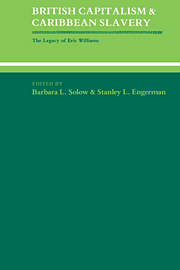Book contents
- Frontmatter
- Contents
- List of Contributors
- Preface
- British Capitalism and Caribbean Slavery: The Legacy of Eric Williams: An Introduction
- Part I Slavery as an Economic Phenomenon
- Part II Caribbean Slavery and the Industrial Revolution
- Capitalism and Slavery in the Exceedingly Long Run
- Slavery and the Development of Industrial Capitalism in England
- The Slave Trade, Sugar, and British Economic Growth, 1748–1776
- Part III The Decline of the British West Indies
- Part IV The Basis of Abolition and Emancipation
- Part V Capitalism and Slavery in Historical Perspective
The Slave Trade, Sugar, and British Economic Growth, 1748–1776
Published online by Cambridge University Press: 15 December 2009
- Frontmatter
- Contents
- List of Contributors
- Preface
- British Capitalism and Caribbean Slavery: The Legacy of Eric Williams: An Introduction
- Part I Slavery as an Economic Phenomenon
- Part II Caribbean Slavery and the Industrial Revolution
- Capitalism and Slavery in the Exceedingly Long Run
- Slavery and the Development of Industrial Capitalism in England
- The Slave Trade, Sugar, and British Economic Growth, 1748–1776
- Part III The Decline of the British West Indies
- Part IV The Basis of Abolition and Emancipation
- Part V Capitalism and Slavery in Historical Perspective
Summary
That from the encreasing luxury of our Country [i.e. Britain], the advance of the sugar keeps pace with the advance upon the Slaves.
British overseas trade grew substantially during the eighteenth century. Data derived from customs records indicate that the official value of British exports (excluding re-exports) rose almost sixfold over the century while imports increased over fivefold. The growth of trade was by no means steady and was frequently disrupted by war, but it accelerated distinctly over the course of the century; the annual level of trade rose by 0.8 percent before 1740, by 1.7 percent between 1740 and 1770, and by 2.6 percent thereafter. Overall, overseas trade grew faster than either British population or total output. Per capita imports and exports thus increased significantly during the century, and a rising share of British output, especially industrial output, was exported. It has been estimated that exports' share of output doubled over the century, rising from 7 or 8 percent at the beginning to 16 or 17 percent at the end. Exports' share of industrial production is calculated to have grown from one fifth to one third during the same period.
Although there appears to be widespread agreement about the general contours of British overseas trade and its share of British output, there is little consensus about either the causes of the growth of trade or its relationship to British industrialization.
- Type
- Chapter
- Information
- British Capitalism and Caribbean SlaveryThe Legacy of Eric Williams, pp. 103 - 134Publisher: Cambridge University PressPrint publication year: 1988
- 1
- Cited by



